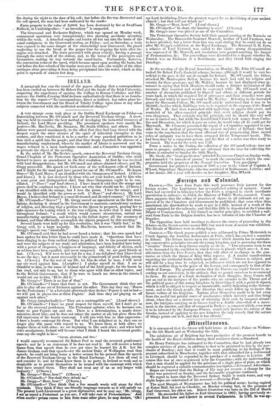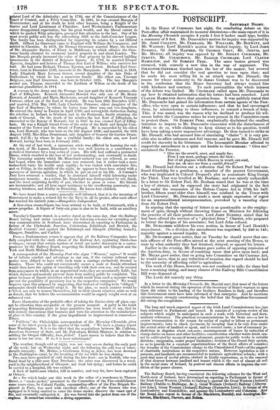_Miscellaneous.
It is announced that the Queen will hold levees at James's Palace on Wednes- day the 5th March and on Wednesday the 12th.
The salubrious air of Brighton has been productive of the greatest benefit to the health of the Royal children during their residence there.—Standard
Sir Henry Pottinger has intimated to the Committee, that he had already two complete services of plate, in addition to that to be presented to him by the mer- chants of Bombay; and that it would be most gratifying to his feelings if the amount subscribed in Manchester, together with that subscribed for a testimonial in Liverpool, should be expended in the purchase of a residence in lAndon. Of course this was at once acquiesced in by the Committee; with the understanding that a sum should be applied for the purchase of a single piece of plate, on whmcls should be engraved a suitable commemorative inscription.—Lirerpool Advertiser.
Hopes are renewed that the Bishop of Ely may yet recover. a change for the better was perceived on Sunday, and the favourable symptoms continued. We regret to learn that the Reverend Sydney South is much worse, and very slight hopes are entertained of his recovery.—iforning Post.
The aged Marquis of Westminster has left the political scene; having expired at Eaton Hall, his seat in Cheshire, on Monday evening last, in the presence of Earl Groevenor, his eldest son. Robert Grosvenor was born on the 22d of March 1767. He succeeded his father as Earl Grosvenor in 1802; haying preciously re- presented East Lone and Chester in several Parliaments, In 1789, he was op- pointed Lord of the Admiralty; and in 174, one of the Commissioners of the Board of Control, and a Privy Councillor. In 1881, he was created Marquis of Westminster; and at his death he held other honours, being a Knight of the Garter and Lord Lieutenant of Flintshire. Lord Westminster's Parliamentary career disappointed expectation; but his great wealth, and the liberal extent to which he pushed Whig principles, procured him attention to the last. One of his most recent public acts was the subscribing 5001 to the Anti-Corn-law League. The family has been distinguished for improving its estates by a not illiberal thrift. Gilbert Le Grosvenor came to England with William the Conqueror, and Settled in Cheshire. In 1676, Sir Thomas Grosvenor married Mary, the heiress of Mr. Alexander Davies, of Ebury in Middlesex by which alliance the Gros- venor family obtained its enormous landed property in and about London. The late Marquis greatly increased the value of that property by his shrewd building investments in the district of Belgrave Square. In 1794, he married Eleanor Egerton, daughter and heiress of Thomas first Earl of Wilton; who survives her lord. He had issue Richard, Thomas Egerton, and Robert. Richard Earl Gros- venor, born in December 1799, succeeds to the Marquisate. He married, in 1819, Lady Elizabeth Mary Leveson Gower, second daughter of the late Duke of Sutherland; by whom he has a numerous family. His eldest son, Viscount Belgrave, now Earl Grosvenor, was born in October 1825. The lateMarquis's second son Thomas, succeeded to the Earldom of Wilton on the death his maternal grandfather, in 1814.
A veteran in the Army and the Peerage has just paid the debt of nature—the Earl of Effingham. Kenneth Alexander Howard was only son of Mr. Henry Howard, of Arundel, and Maria Mackenzie, second daughter of Kenneth Viscount Fortrose, eldest son of the Earl of Seaforth. He was born 29th November 1767; and married, 27th May 1800, Lady Charlotte Primrose, eldest daughter of the late Earl of Rosebery; by whom he leaves issue three sons and two daughters. He entered the Array as Ensign in April 1786; and served,with distinction during the rebellion in Ireland, in Scotland, and in the Peninsula; finally attaining the rank of General. On the death of his relative the last Earl of Effingham, he succeeded to the Barony of Howard ; but in 1837 he was created Earl of Effing- ham. He was a Knight Grand Cross of the order of the Bath and Knight Com- mander of the Tower and the Sword of Portugal. He is succeeded by his eldest son, Lord Howard; who was born on the 23d August 1806; and married, the 18th August 1832, bliss Eliza Drummond, only daughter of General Sir Gordon Drum- mond, G.C.B.; by whom he has a youthful family; his eldest son, now Lord Howard, having been born in February 1837.
At the end of last week, a numerous circle was afflicted by learning the sud- den death of Mr. Leman Blanchard; who was well known as a contributor to periodical literature for a long series of years. His wife had suffered a protracted lllnes8, which resulted in the loss of her understanding, and eventually in death. The harassing anxiety which Mr. Blanchard endured was not relieved as some had ho*, when the immediate cause was removed, but it rather took a more melancholy turn: his health sank rapidly; he was visited with convulsive fits; and on Fnday, in the middle of the night, he appears to have been seized with a paroxysm of nervous agitation, in which he put an end to his life. A Coroner's Jury have returned a verdict, that he destroyed himself while labouring under temporary insanity.. As a writer, Mr. Blanchard was distinguished by wit, finish, and the most surprising facility of pen, whether in prose or verse. His friends are innumerable; and all bear eager testimony to his overflowing generosity, un- ceasing kindness, and fidelity in friendship. He leaves four children.
We have heard from a source generally well informed, that it is the intention of Government to make a retired list for the Navy in all its grades, after each officer has reached his sixtieth year.—Hampshire Independent.
A first-class steam-frigate has been ordered to be built, at Portsmouth, with a screw-propeller. A frigate of forty-six guns is also to be built, with an auxiliary screw.
Tuesday's Gazette stated, in a notice dated on the same day, that the Railway Board having had under consideration the following schemes for extending rail- way communication in Scotland, have determined on reporting to Parliament in favour of the Clydesdale Junction' Caledonian, Edinburgh and Hawick, the Scottish Central; and against the Edinburgh and Glasgow (Stirling branch), Glasgow, Dumfries, and Carlisle.
From a Parliamentary return it appears that all the Railway Companies have fully. complied with the sixth clause of the Railway Act, regulating third-class ePrnages; except that certain matters of detail are under discussion in a corres- pondence by the Railway Board, respecting the Edinburgh and Glasgow and the York and North Midland Railways.
A correspondent of the Morning Post who signs "Women," says—" It would be of infinite comfort and advantage to our sex, if the various railroad com-
es were obliged to have with each train a carriage exclusively devoted to frmales. Those who could not conveniently secure a male or female attendant would then have the option of travelling only with their own sex, and be secured from annoyances to which, in an unprotected state, they are occasionally liable, but which shyness and modesty prevent them from making public by complaint. The great increase of female travellers which would result from such a measure would pre7ent the possibility of pecuniary loss to the respective companies." We would improve upon this proposal by suggesting., that instead of waiting to be "obliged companies should voluntarily adopt it. By the plan, so much anxiety would be relieved, not only to women themselves, but to thew absent relatives, male as well as female, that we believe the accommodation would be eagerly sought even at an enhanced cost.
Facts illustrative of the probable effect of taking the Excise-duty off glass can- not be otherwise than acceptable at the present moment. A party in the habit of importing Bohemian glass in large quantities has been heard to say, that he will entirely discontinue that business and turn his attention to the manufacture of glass in this country, if the great impediment to improvement is removed.— Times.
" Publicus," the Philadelphia correspondent of the Morning Chronicle, gives some of the latest gossip in his quarter of the world. "We have a gloomy report from Washington. It is to the effect that the negotiations between Mr. Calhoun, American Secretary of State, and Mr. Pakenham, British Minister, in relation to settling the Oregon difficulty, have failed! I have reason to believe that the ni- mour is but too true. If so, it is most unfortunate."
The weather, though cold at night, was not very severe during the early part of the week; but on Wednesday night and the following the cold was of consi- derable intensity. Mr. Halm°, a Gentleman living at Acton, has been drowned in the Paddington canal, by the breaking of the ice while he was skating.
Two men have perished of cold during the late frost : one in Norfolk, who was found dead by a stile near East Dereham; the other was discovered in a wood- yard in the neighbourhood of Glasgow, not dead but dying; and before he could be carried to alospital, life was extinct. A flock of bottle-nose whales, 139 in number, and very fat, have been captured at Orkney. At a fire which broke out this week in the cellar of a warehouse in Thames Street, a "smoke-jacket," presented to the Committee of the Fire-establishment some years since, by Colonel Paulin, commanding-officer of the Fire Brigade Re- giment in Paris, was used with excellent effect; one of the firemen who was equipped in it being enabled to enter the dense smoke discover the asset spot of fire, and eventually extinguish it. Air was forced into the jacket from one of the - engines. semewhatreeembles a-diving-apparatus.



























 Previous page
Previous page